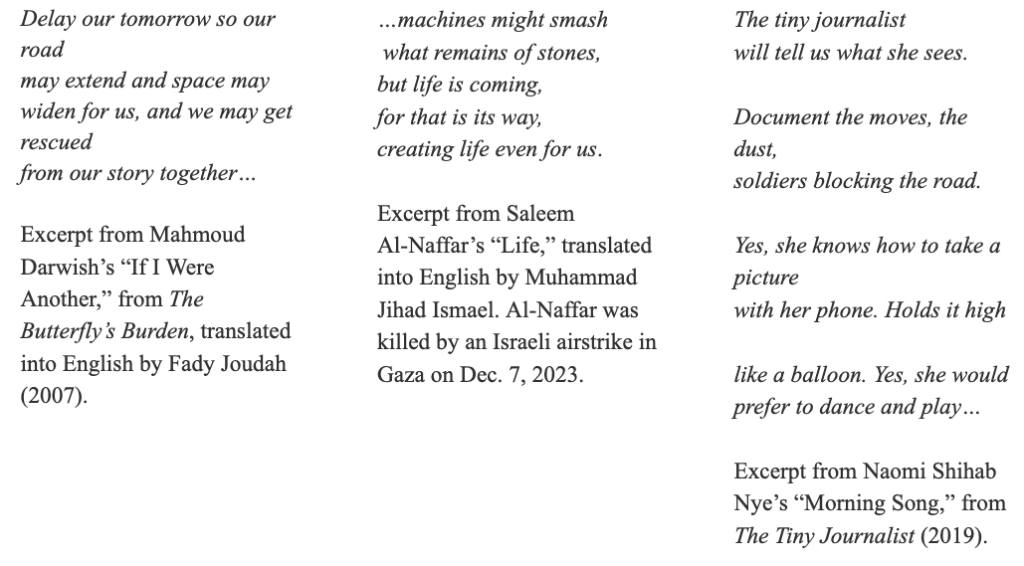Leora Johnson and Salimah Khoja*
Editors-in-Chief, CUNY Law Review
It has been a devastating few months for all human beings invested in collective justice, liberation, and freedom–from Palestine and Israel, to our very own neighborhoods across the U.S. and the world.
These moments simultaneously prompt our sustained solidarity with Palestinian life and liberation in the face of occupation, distinct from any endorsement of Hamas’s attacks on October 7, 2023; grief and outrage over the killing of more than 1,200 people in Israel and kidnapping of 240 more in those attacks; further grief and outrage over Israel’s military assault in Gaza and recently in the West Bank, killing more than 23,000 Palestinian people, with many more presumed dead, injuring over 59,000 more, and displacing over 90% of Gaza’s population of 2.3 million at grave risk of genocide; grief and outrage at the upsurge of antisemitic and Islamophobic violence and rhetoric across the world; and grief through a continued reckoning with more than 75 years of historical and political context.
We believe in the possibility of holding these multiple and intertwined griefs at once. The totals of those killed are not separate tallies; they are not numbers. They are full human beings lost to a draconian militarization that will not yield Palestinian and Jewish safety and thriving life. It is this very connectedness that grounds the CUNY Law Review’s past and present solidarity with Palestinian liberation. It is a solidarity that mandates Palestinian freedom and self-determination, and the protection and thriving of all our communities–Jewish, Muslim, and beyond. And it is one rooted in the journal’s mission to produce public interest-oriented legal scholarship that works towards the exposure and dismantling of oppressive systems.
Nevertheless, members of the CUNY Law Review, like many progressive communities and even other organizations on our campus, struggled immensely with one another over when and how to demonstrate this solidarity as we disagreed over a call to cosign the particular content of another campus group’s statement issued just after October 7. These tense disagreements generated discussion and writing to each other internally, as well as exploring how human rights lawyers and experts are navigating the ongoing crisis in Gaza. Even so, the seeming impasse and interpersonal toll inspired many of us to seek space for solidarity and grief elsewhere. Accordingly, it was challenging for the CUNY Law Review to find additional ways to speak externally in that moment on the points that do hold us together. Still, the moments to speak up continue.
These differences do not change the underlying and sustaining mission that guides our work. It is our quest to hold steadfast to this very mission that sustains our continued solidarity with Palestinian people; a call and hope to end the U.S.-backed Israeli military assault and staggering devastation in Gaza; and for sustainable, human- and liberation-centered political solutions and dialogue that can eclipse the layers of violence we have witnessed before, on, and after October 7.
Of course, there is little consensus about what that solution actually looks like. But no path to liberation, justice, and peace exists without a reckoning of the structures and systems that have made such liberation unrealized up to now.
In this spirit, we revisit CUNY Law Review’s November 22, 2023 blog post exploring the perspectives of human rights attorneys and scholars on “the promises and failures of domestic and international law in addressing the atrocities and their aftermath” in Gaza. As law students, we also grapple with the questions of war crimes and violations of international humanitarian law, and the stymieing of voices that are speaking up for Palestinian human rights.
The CUNY Law Review–with its place in legal scholarship–is one tool in an ecosystem of work towards collective freedom, equality, and dignity. We believe it is a useful one, as this journal maintains a tradition of publishing scholarship that addresses and incorporates legal issues in Palestine and Israel, and within Palestinian organizing. These are necessary perspectives, and the Law Review is committed to their free expression.
We speak up here to not only mourn the dead, but to sustain life and collective humanity in the first place.
*Leora Johnson and Salimah Khoja, CUNY Law Class of 2024, are co-editors-in-chief of the CUNY Law Review. They offer this statement in their individual capacities.
